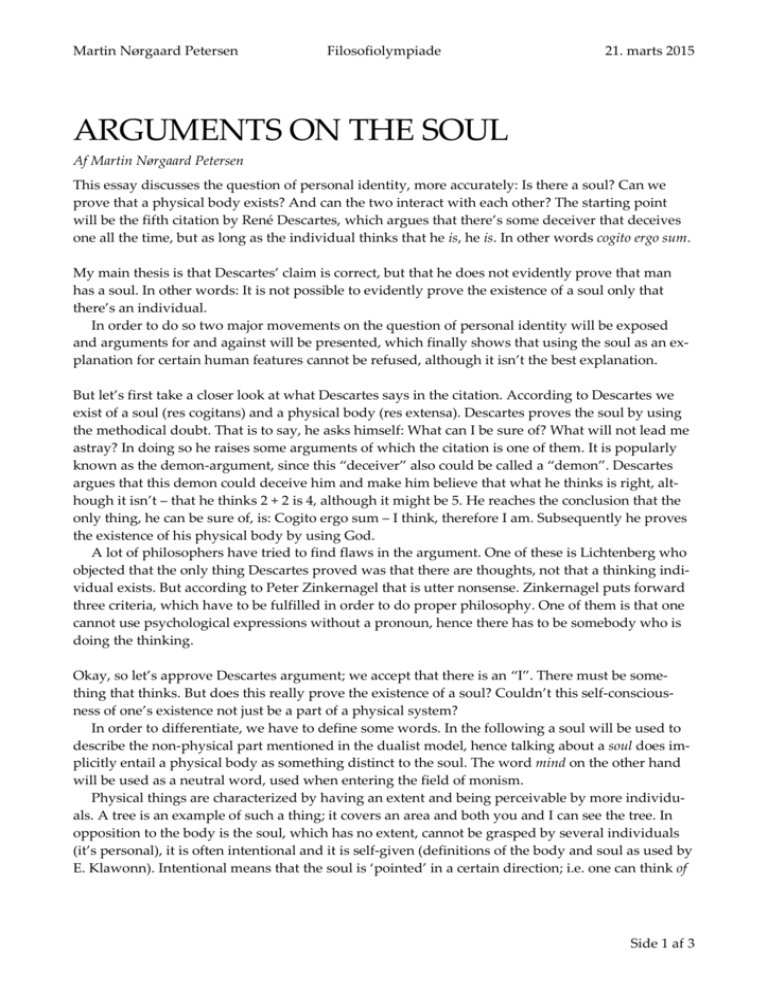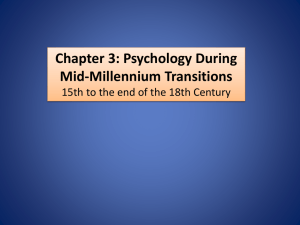Af Martin Nørgaard Petersen
advertisement

Martin Nørgaard Petersen Filosofiolympiade 21. marts 2015 ARGUMENTS ON THE SOUL Af Martin Nørgaard Petersen This essay discusses the question of personal identity, more accurately: Is there a soul? Can we prove that a physical body exists? And can the two interact with each other? The starting point will be the fifth citation by René Descartes, which argues that there’s some deceiver that deceives one all the time, but as long as the individual thinks that he is, he is. In other words cogito ergo sum. My main thesis is that Descartes’ claim is correct, but that he does not evidently prove that man has a soul. In other words: It is not possible to evidently prove the existence of a soul only that there’s an individual. In order to do so two major movements on the question of personal identity will be exposed and arguments for and against will be presented, which finally shows that using the soul as an explanation for certain human features cannot be refused, although it isn’t the best explanation. But let’s first take a closer look at what Descartes says in the citation. According to Descartes we exist of a soul (res cogitans) and a physical body (res extensa). Descartes proves the soul by using the methodical doubt. That is to say, he asks himself: What can I be sure of? What will not lead me astray? In doing so he raises some arguments of which the citation is one of them. It is popularly known as the demon-argument, since this “deceiver” also could be called a “demon”. Descartes argues that this demon could deceive him and make him believe that what he thinks is right, although it isn’t – that he thinks 2 + 2 is 4, although it might be 5. He reaches the conclusion that the only thing, he can be sure of, is: Cogito ergo sum – I think, therefore I am. Subsequently he proves the existence of his physical body by using God. A lot of philosophers have tried to find flaws in the argument. One of these is Lichtenberg who objected that the only thing Descartes proved was that there are thoughts, not that a thinking individual exists. But according to Peter Zinkernagel that is utter nonsense. Zinkernagel puts forward three criteria, which have to be fulfilled in order to do proper philosophy. One of them is that one cannot use psychological expressions without a pronoun, hence there has to be somebody who is doing the thinking. Okay, so let’s approve Descartes argument; we accept that there is an “I”. There must be something that thinks. But does this really prove the existence of a soul? Couldn’t this self-consciousness of one’s existence not just be a part of a physical system? In order to differentiate, we have to define some words. In the following a soul will be used to describe the non-physical part mentioned in the dualist model, hence talking about a soul does implicitly entail a physical body as something distinct to the soul. The word mind on the other hand will be used as a neutral word, used when entering the field of monism. Physical things are characterized by having an extent and being perceivable by more individuals. A tree is an example of such a thing; it covers an area and both you and I can see the tree. In opposition to the body is the soul, which has no extent, cannot be grasped by several individuals (it’s personal), it is often intentional and it is self-given (definitions of the body and soul as used by E. Klawonn). Intentional means that the soul is ‘pointed’ in a certain direction; i.e. one can think of Side 1 af 3 Martin Nørgaard Petersen Filosofiolympiade 21. marts 2015 something and by calling it self-given it is assumed that the soul is given in it self. In other words if I feel pain, I don’t necessarily need to be conscious about it – it’s just there. Now back to the question of what “I” am. In opposition to dualism, we find monoism, which claims that one only exists of one single matter; either a soul or a physical body. Assuming the former is idealism, whereas assuming the latter is materialism. Berkeley was a proponent of idealism but as Zinkernagel has called to attention, the idealistic version does not live up to the three criteria mentioned earlier. This will, for now, act as argument as to why we won’t use more time on this model – although one could easily dig deeper into arguing for and against this view. Materialism, on the other hand, argues that the world is only built of tiny indivisible physical parts, which act under the laws of physics. This model was extremely popular in the age of Newton where laws describing the motion of physical objects were presented. According to these laws one should be able to deduce the position, speed and acceleration of everything, independent of time; in other words one should be able to read the future (and the past), since everything obeyed these laws – physical determinism had been invented. The question is: Can our mind really just be purely physical – are we not in the need of a nonphysical matter? One could object that we need souls in order to animate our body, but robots, which are animated, have existed for a long time. Then one could object that we need a soul in order to move purposely, but likewise one could argue that biologist have explained how plants can move their petals towards the Sun and they do not require the existence of a soul, nor a mind. Finally one could ask; what about free will – don’t we need a soul in order to have free will? This is a trickier question. The argument could go as follows: Premise I: Subjects to determinism do not have free will Premise II: Free will and determinism is incompatible Premise III: All physical objects are subject to determinism Conclusion: We need something non-physical in order to have free will! Well, the argument is valid, but maybe we need to take a closer look at the premises. Premise I can hardly be questioned, whereas one could briefly imagine a system where premise II was false, although it seems wrong. Nonetheless if we accept both the first and the second premises, premise III is not true in all areas. Digging deeper into physics, one realizes that not every physical object is a subject to determinism. Look at radioactivity as an example: One knows that the probability that an atom decays in the next hour has a certain value, but one cannot say which atom – out of many – will decay at what time. As far as we know yet, there’s no reactions in the atom that causes it to decay. Maybe we’ll discover that there is such a reaction and in that case we have to verify premise III, but it seems unlikely. What about reasoning? Couldn’t one imagine that one needs a soul in order to reason? Maybe, but if we look at chess-computers, some have actually become so advanced that they beat the grand masters of chess. What makes it reasonable to think that chess-computers can reason, is that they do not just calculate the given possibilities from a certain point and then find the ‘best’ way to victory, no, they have been fed with loads of old games and they use all sorts of algorithms in order Side 2 af 3 Martin Nørgaard Petersen Filosofiolympiade 21. marts 2015 to find the best solution. Nobody has shown them how to beat the masters, they invented the steps by themselves; they have been creative. One could object that such a thing is not reasoning, the computer is after all just following its codes. But isn’t that just prejudice? Isn’t that just because we say that computers should not be able to reason? And after all – how do our reasoning differ from the computer’s? Don’t we just create new ‘steps’ on the basis of history, experience, upbringing and schooling? The real question one has to ask is: Do these computers have emotions? Do they feel good when they win or bad when they don’t? In order to know, we have to distinguish between the behavioural side and the ‘feeling side’. Take a smile as a way of illustrating this. The behavioural side of a smile can be described be naming the lips’ form, the eyes, the wrinkles and so on, but there’s more to a smile than that. A smile feels a certain way. One can easily build a robot, which can reproduce the behavioural part of a smile – but so far no robot knows how a smile feels. So maybe we need a soul. When we try to explain a certain phenomena in philosophy that cannot be researched empirically, we have to cling to the best explanation (not doing so would be religion or other parts of humanities). Let’s take atoms as an example: We cannot see atoms, but we see a lot of consequences, which could be explained by atoms. So far atoms are the best explanation and therefore we believe in atoms; we talk about inference to the best explanation. Now we’ve reached a point where we can see that physics cannot describe certain features. These features are explained by the soul in the dualistic model. So according to the above, we should cling to the dualistic explanation. Or should we? Because is the dualistic version really a valid explanation? What is a soul? That’s a hard question to answer and one may not be fooled to believe that the question can be answered as if by magic. No one has yet given the answer to how the two matters act on each other. Is it really possible for two so different matters to react on each other? In Plato’s dialogue, Pheado, Sokrates argues that the soul is immortal and lives forever, whereas Kebes suggests that the soul is like the sound from a lyre and Simmias proposes that the soul is like a cloak that will be worn off with time. Although Sokrates proposes answers to these objections in the Pheado, the examples demonstrate that positing a soul causes a lot of new questions. As to conclude we see that the monistic model can’t explain everything. But just because dualism can, it doesn’t mean we have to dismiss the fact that the explanation is very weak. Centuries ago people wouldn’t be able to explain how a plant grows without positing a soul. Had you told them that it was actually a little machine consisting of small indivisible parts they would have found it hard to believe (and would probably have burnt you at the stake), but today we know that plants consists of molecules and atoms. Likewise one could think that although we don’t understand consciousness and the mind yet, maybe we will be able to do so in a century or more. Citation by René Descartes: There is some deceiver or other, very powerful and cunning, whoever employs his ingenuity in deceiving me. Then without doubt I exist also if he deceives me, and let him deceive me as much as he will. He can never cause me to be nothing so long as I think that I am something. So that having reflected well and carefully examined all things, we must come to the definite conclusion that this preposition: I am, I exist, is necessarily true each time that I pronounce it, or that I mentally conceive it. Side 3 af 3





